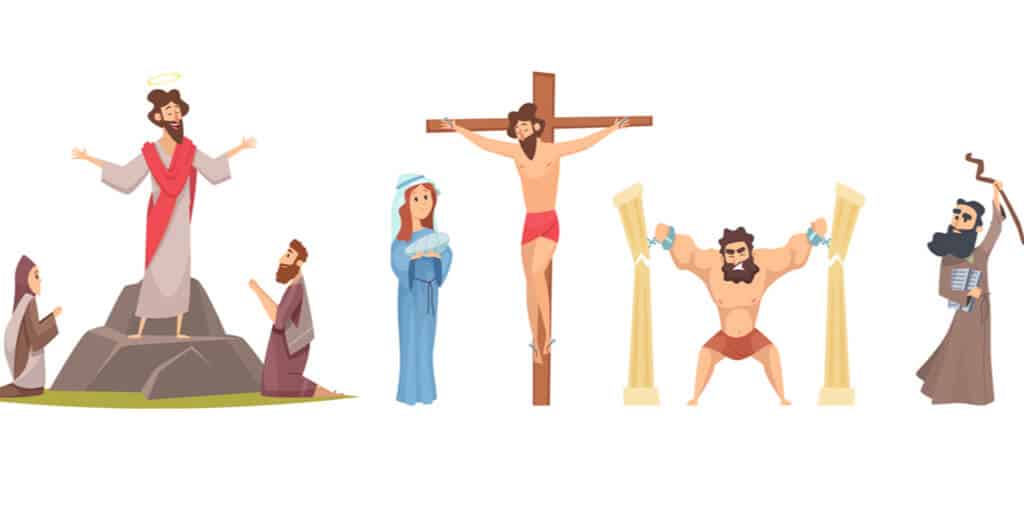Flannelgraph Stories: Series Introduction

Do you remember going to Sunday School every week? Do you remember your teacher using cut out figures which magically stuck to a flannel background as she or he told you stories from the Bible? Do you have favorite stories you go back to time and again, telling and retelling, or reading and rereading that story because it spoke to you in some way?
Well, I’m old enough to remember those days. In fact, I taught using flannelgraph figures for many years myself. It was a joy for me to introduce a new generation of children to those old familiar stories from the Bible.
But something has happened. As time has gone by, it seems that teaching those Bible stories in Sunday School classes is no longer a part of our normal life, even in good evangelical churches. When I was teaching a class of adult women a few years ago, I realized that I couldn’t just refer to, for instance, David and Goliath, or Jonah and the whale, or Lot’s wife. I had to stop and briefly tell the story, otherwise, the point of my lesson would be completely lost. Many of those women, even some who grew up in church, just didn’t know those stories.
I found the same thing to be true a few years later teaching a class of middle school students. Many, including the pastor’s daughter (!), were completely unfamiliar with the stories found in the Old Testament.
I wonder if the same thing is true for you when you read the New Testament and come across an instance where Jesus refers to an Old Testament story in His teaching. Do you just skip over that because it makes no sense to you? Do you miss His point because you can’t relate back to that Old Testament event?
What I would like to do is help you rectify that. Over the next few weeks I plan to take some of the stories that Jesus spoke about, and briefly tell you that story. For some of you, these may be very familiar “favorites”; others will be rather obscure, but important nonetheless if Jesus spoke of them. I’ll also try to give you some hint as to why that story was important; why Jesus would have used it.
Three things before we begin. First, I’m firmly convinced the Bible is, as it claims, the inspired Word of God. We read in 2 Timothy 3:16-17 (I’ll quote the Amplified (AMP) version here), “Every Scripture is God-breathed (given by His inspiration) and profitable for instruction, for reproof and conviction of sin, for correction of error and discipline in obedience, [and] for training in righteousness (in holy living, in conformity to God’s will in thought, purpose, and action), so that the man of God may be complete and proficient, well fitted and thoroughly equipped for every good work.”
I agree, God also reveals Himself to us through the world that He has created, and most especially in His Son, Jesus. But that doesn’t mean we can or should neglect the information He has given us through the writers of Scripture.
Second, I am firmly convinced that God is indeed the one who created the world and everything in it. John 1:3 (AMP) explains, “All things were made and came into existence through Him; and without Him was not even one thing made that has come into being.” Moreover, I am convinced that He is fully aware of all that goes on in His world, and that He is moving forward to that time when He will restore the world to the condition it was in immediately after He created it. In Genesis 1 we read: “And God saw that it was good (fitting, pleasant) and He approved it” (Genesis 1:4, 10, 12, 18, 21, 25, 31). One day the world will again be fitting and pleasant in God’s sight. I can’t wait, can you?
Third, I’m firmly convinced that God wants a relationship with us. He wants that relationship that was broken in the Garden when Adam and Eve sinned to be restored. And He’s willing to go to quite extraordinary lengths to make that happen. He tells us in John 3:16 (AMP), “For God so greatly loved and dearly prized the world that He [even] gave up His only begotten (unique) Son, so that whoever believes in (trusts in, clings to, relies on) Him shall not perish (come to destruction, be lost) but have eternal (everlasting life.”
Let me just stop for a moment and explain why I have used the Amplified Version here. Don’t you find that when you come to very familiar verses you just tend to skip over them, not really paying attention? Okay, maybe that’s just me! But I find that reading a familiar verse in an unfamiliar version helps me actually read it, not skip it. Feel free to pull out your own Bible in your favorite translation if you prefer. The important point is that you read it.
Stay tuned as we take a look at stories Jesus used when He taught.






